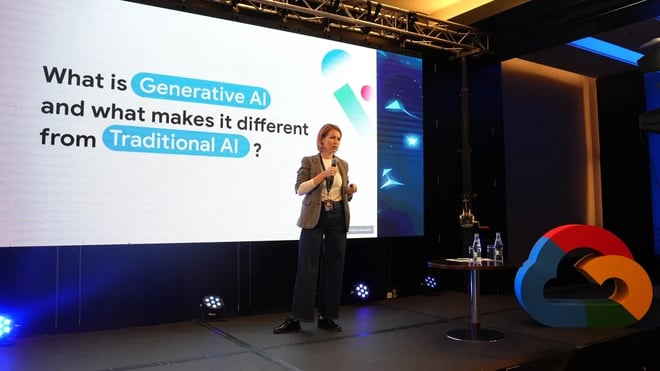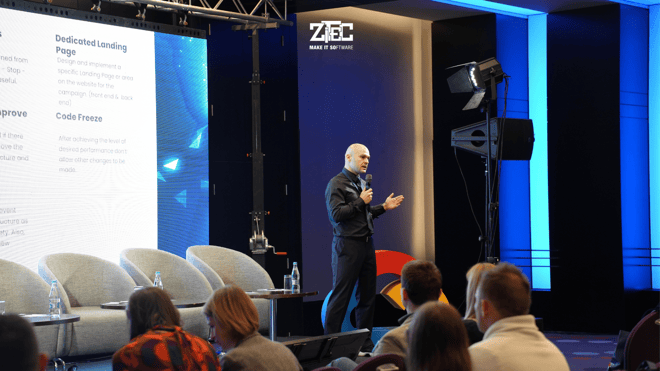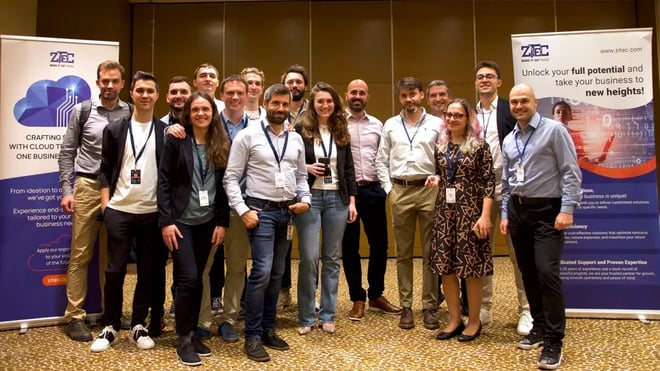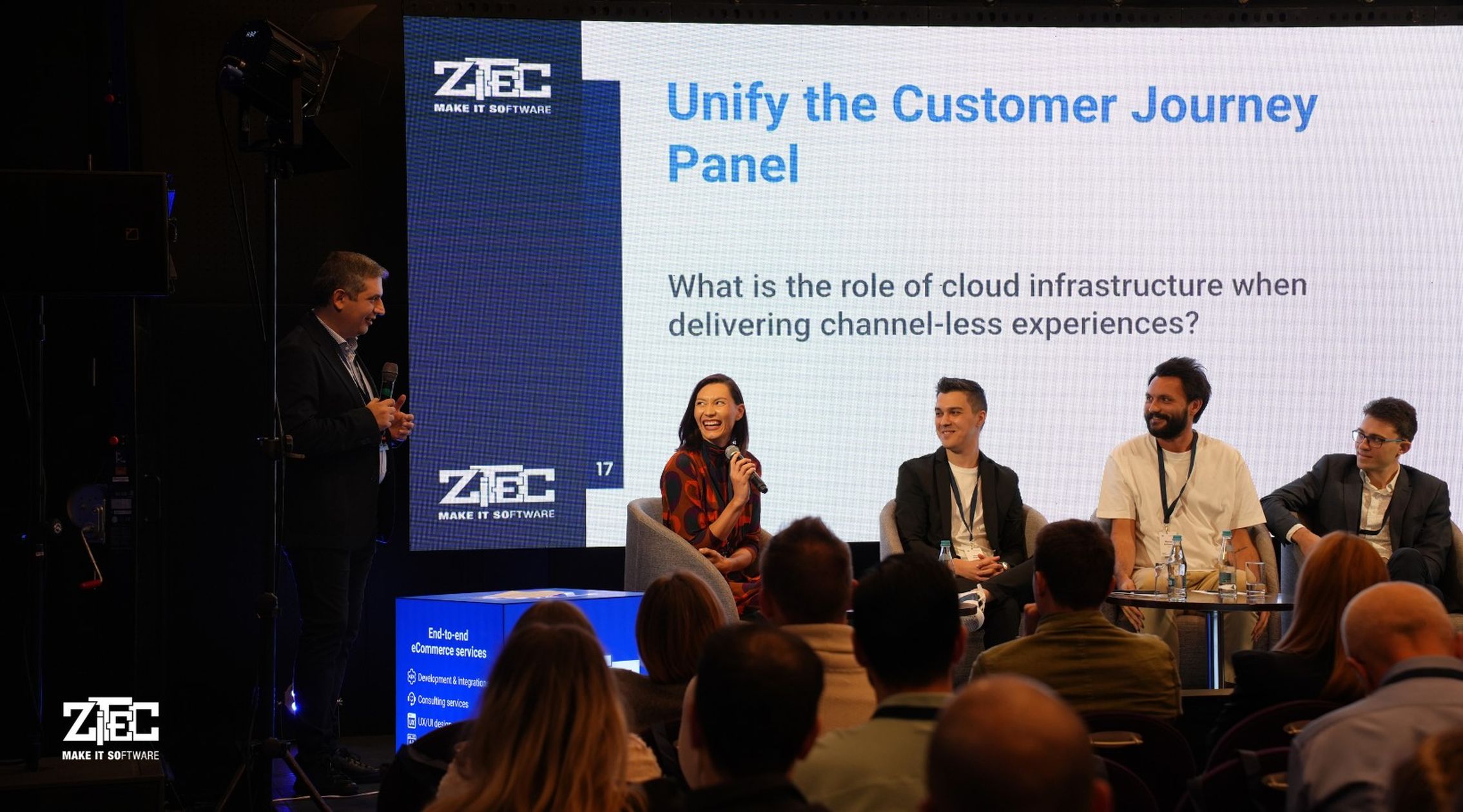A huge shoutout is due to our partners at Google and our customer AdoreMe, whose knowledge sharing and examples were nothing short of inspiring, along with the 100+ retail leaders who joined us in person. Their participation sparked deep discussions and thought-provoking questions.
Missed out? No worries. This write-up is your portal to the insights shared, unpacking the technologies and trends poised to revolutionize customer experiences, spike revenue, and streamline operations in 2024 and beyond. Let's dive in.
Retail mastery in a nutshell
Here are some highlights to get you started, as shared by each of our speakers and panelists.
Alexandra Bianca Baicu, Account Executive CEE, Google:
Personalization is key, with 80% of consumers expecting tailored searches and product recommendations and having a preference for products they need rather than what brands want to sell.
Elena Stănescu, Cloud Partner Engineer, Google:
Test often and adjust fast, so you can learn what works best for you. Retailers are agile organizations that can benefit a lot from using powerful AI tools, as long as they validate these solutions to ensure they add value to the business.

Elena Stănescu, Cloud Partner Engineer, Google
Andrei Filip, Director of Product Management, Adore Me:
At AdoreMe, we like to say our values are eat, sleep, data. So these are three things that are vital to us. This is why our data infrastructure is so important to us, our data warehouse, as well as all the tools that go on top, like BigQuery and Looker Studio, helping us to learn more and grow. For us, retail mastery is data combined with experimentation.
Marius Bălteanu, Chief Information Officer & Partner, Zitec:
Infrastructure is to a company what a foundation is to a house. When you want to add levels or change things about your structure, unless you have a good foundation, the house can collapse. An optimized infrastructure allows you to offer a good experience. If parts of your infrastructure are missing, your experience will not be great.
Iulian Oprea, Mobile Business Line Director, Zitec:
Integrating systems is the most complicated part of providing a great omnichannel experience. We need channels to harmonize. The solution to this challenge is complex. Consolidating software infrastructure is key, as is having a team with an overview of the technical systems in the company. Data flows need to be integrated as well, so having the same structure across channels helps.
Alex Dobre, eCommerce Business Line Director, Zitec:
Decisions cannot be made on a whim. Calculate the cost of upgrading your omnichannel approach, but also calculate the cost of doing nothing. One size does not fit all, and we have to understand, for each market and sub-segment, what works and what doesn’t.
Yiannis Papazoglou, Channel Territory Manager, Google Cloud:
Nowadays, user experience is everything. Half of in-store shoppers leave after 15 minutes of waiting time, while 50% of mobile shoppers abandon a site after a 3-second load time. Over 80% of shoppers say they researched online before going in-store. Retailers must connect with consumers at every touch point, and Google can empower companies to transform their entire value chain.
Panos Kafantaris, Sales Engineering Manager, Google Cloud:
Generative AI is driving new opportunities through operational efficiencies, cost savings, and value creation. Generative AI can help retailers in 3 main areas: generating and optimizing content, creating conversational commerce experiences, and automating and improving operations.
Marius Gherghe, Continuous Improvement Solutions, BL Director, Zitec:
Planning for events, like Black Friday campaigns, can be split into what we do before, during, and after the event. They say to train hard and run easy. In a lot of ways, what you do before the event represents the core and most important part of your preparation.

Marius Gherghe, Continuous Improvement Solutions, BL Director, Zitec
Mihail Mușat, DevOps Business Line Director, Zitec:
Thanks to good planning throughout the full year, one of our customers, an eCommerce retailer, was able to support a traffic of 40,000 users per hour. They had double the expected traffic during the event. Their load and performance testing and Kubernetes migration led to zero downtime during the annual Black Friday online campaign.
Adina Nichitean, Security & Data Protection Business Line Director, Zitec:
Retail is one of the industries that attracts the most cyberthreats: 24% of total attempts target retailers. If successful, an attack will often translate into a decrease in revenue due to a decrease in consumer trust. As attacks become more sophisticated, you must become more sophisticated with your preventive measures.
Radu Săndulescu, Data Analytics & Operations Director, Zitec:
By integrating AI with predictive analytics, your organization can reach new levels of efficiency and insight. This powerful combination not only leads to reduced inventory costs and precise demand forecasting but also minimizes waste. AI enables personalization and elevates customer service standards. Leveraging these intelligent solutions effectively, retail companies can revolutionize both their in-store and online experiences, paving the way for sustainable growth and innovation.
Wrapping up our highlights, Ionuț Cociaș, Cloud Business Line Director at Zitec, masterfully steered the event - both the Bucharest and the Athens edition - as the host and moderator. He asked challenging questions, bridged the gap between the audience and speakers, and acted as the catalyst for engaging dialogue.

Google and Zitec teams in Athens on November 2, 2023
Challenges retailers face in providing a great omnichannel experience
Implementing an effective omnichannel strategy is not without its hurdles, ranging from strategic channel selection and data integration to technical harmonization and adapting to market shifts.
During the ‘Unify the customer journey - omnichannel & phygital’ talk, panelists identified some key issues, offering insights into how businesses can overcome them to create a customer-centric experience.
First of all, true omnichannel isn't about being present on every channel.
“Omnichannels does not necessarily mean being present on all channels; it means being where your customers are and where you make the most revenue. That’s where most of your investments should go and where you need to focus and provide a great experience,” as Google’s Alexandra Bianca Baicu pointed out.
On the other hand, data integration is essential for seamless experiences. Yet many companies struggle to fully utilize the data they collect, which is crucial for customer engagement and service improvement.
Achieving a uniform customer experience across channels is challenging and requires thorough UX research and UI testing.
Other factors that play a significant part in building a great omnichannel experience range from technical integration complexity to specific market dynamics or cloud infrastructure adoption and modernization.
As Zitec’s Iulian Oprea mentioned, part of the difficulty lies in integrating systems to ensure harmony across channels, necessitating a unified software infrastructure.
Adapting to market dynamics is another side of it. Alex Dobre highlighted that retailers face the choice between cost reduction and adding value, with strategies needing to be tailored to specific markets.
Emphasized by Marius Bălteanu, cloud infrastructure is likened to a foundational element in construction, essential for flexibility and speed in retail operations.
The role of AI in the customer’s experience with a retailer
As AI evolves to offer highly relevant and personalized experiences, there's a balancing act between convenience and privacy, with relevance being the keyword. What is most relevant to your business? AI covers a full spectrum of solutions, so you have to be able to select the ones that are best suited for you.
“You need to be able to offer experiences that are highly relevant and personalized. But there is a fine balance. If the suggestions are too relevant, you might feel like they're invading your privacy. You can also explore Recommendations AI, combining VR with AI-generated content for shopping experiences or conversational commerce. But ultimately, relevance is most important, and testing the tools that best fit your audience and your business,” said Zitec’s Alex Dobre.
Virtual assistants, for instance, are transforming customer service by providing instant solutions, a significant leap from the traditional multi-day response times.
Personalized recommendations are becoming increasingly sophisticated, tailoring suggestions based on customers' browsing and purchase histories, as well as their specific online behaviors.
This level of customization is expanding into diverse sectors, from beauty products to footwear, where AI algorithms can suggest products like personalized beauty rituals or shoes based on foot shape.
The underlying consensus is clear: for retailers to stay competitive and relevant, integrating AI into their customer engagement strategies is not just an option but a necessity.
One aspect that is crucial for success in 2024
From testing to sustainability, from personalization to having a challenger’s mentality, here are some factors that might pave the way to success in the following year and beyond.
Start by testing any technology you want to integrate into your toolkit. Avoid making big investments in technologies that might not fit. Try to understand the technology and how it might help you build a business case. Keep looking for the right match for your organization, as the market is moving with or without you, and you will want to stay ahead.
Recommendations AI is a top candidate for experimentation in retail and can deliver remarkable results to companies. At Zitec, alongside one of our clients, a prominent online retailer in the CEE, we have successfully implemented an AI-driven recommendation project. The initiative has significantly enhanced their customers' shopping experience. It has nearly tripled the revenue generated from "frequently bought together" item recommendations. Additionally, this project has efficiently freed up 25% of previously utilized infrastructure resources.
AdoreMe: business decisions based on facts, not bias
Andrei Filip is a Director of Product Management and has been with AdoreMe for the last 10 years.
Retail mastery for him and his team is a mix of data and experimentation.
“We do a lot of research to make sure that our business decisions are not biased but based on facts. At AdoreMe, we started small with our experiments and grew in complexity from there. We’re currently at 300+ UX experiments that we run annually on our website, and this is a pretty big number. We’re talking about an experiment every 1-2 days. And that’s not all. We succeeded in decentralizing experimentation. Apart from these 300+ experiments, we also have a number of them that can be run at any moment by our marketing team for customer engagement and content creation, independently from the tech teams,” explained Andrei Filip.
He believes machine learning and Gen AI will propel the company to the next level of large-scale experimentation. Examples include continuous experimentation with AI-powered creatives or ML product rankings based on different criteria.
“GenAI and ML are very interesting topics for everyone. But we must learn to walk before we run. I’d like to return to the importance of data. As a foundation, it’s essential to have access to our data, be able to interpret, experiment continuously, and learn.”
The power of generative AI
Elena Stănescu, Cloud Partner Engineer, as well as Panos Kafantaris, Sales Engineering Manager, have focused their presentations on generative AI, talking about the 3 key areas in which generative AI can help create value: generating and optimizing content, creating conversational commerce experiences, and automating and improving operations.
Content creation is time- and resource-intensive. This need can now be addressed through generative AI.
Carrefour is a great example of a brand collaborating with Google and leveraging generative AI for personalized campaigns. Using both prompts and previous campaign information, they are able to customize their next campaigns to ensure improved results.
LPP, a Polish clothing manufacturer managing brands like Reserved, Mohito, House, Cropp, and Sinsay, uses AI for improved customer experience and in their customer service to improve the call center experience. The positive impact for them is noticeable in their increased revenue and lower operating costs.
Brico Depot, on the other hand, chose to create an incubation center to address a high abandonment rate for service center inquiries. They used Google’s Vertex AI to improve their customer satisfaction.
Takeaways
During our events, we’ve asked the participants from both locations—over 100 leaders in the retail business—what their biggest challenges were in creating a seamless omnichannel experience. Customer experience personalization was identified by all who took the live survey as the most significant issue (64% of options in Greece and 48% in Bucharest), followed by aspects like integration hurdles and cross-channel communications.
When asked how they plan to leverage innovation to improve their retail operations, most participant mentioned enhancing data analytics for better decision-making (76% in Greece and 49% in Bucharest) as the leading method. Other actions identified by our participants included cloud adoption or modernization, and integrating automation for efficiency gains.
But these are just a few of the objectives competing for a leader’s attention in a retail company when allocating their annual budget.
Identifying the priorities is crucial, as is making those changes to your retail strategy in order to stay ahead of the competition.
Retail is a highly dynamic sector, and the cost of inaction is steep. The companies that win the race will be those that reach their customers the fastest. And for that, they need to keep testing.








